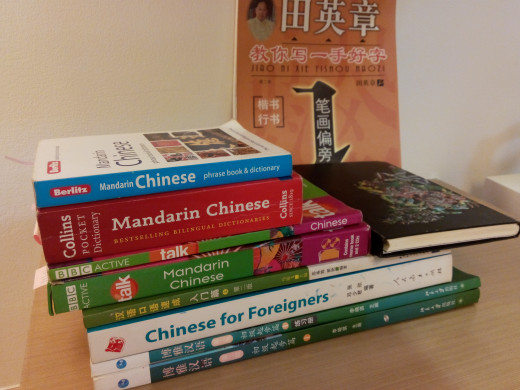Learning Chinese From Behind the Wall
How It All Started

I'd already been in China for over a year when I saw the advert for a four week summer course in basic Chinese at Shenzhen University.
It sounded like a plan. A way to formalise and structure my learning which had been pretty ad-hoc so far. I knew enough to buy things in shops and take public transport but I was using basic sentences, or sometimes just individual words and short phrases. I wanted to go to the next level and speak with confidence and authority using sentences comprised of more than one idea. And, of course, on a less practical note I wanted to show off to my friends and familiy back home in England (well, who wouldn't?).
The Fine Details

In typical Chinese style classes started at 8:30am which, with about 90 minutes travel time, meant that I was more or less up with the larks.
We were given three text books to see us through two morning classes. The first of which was speaking and listening and the second was reading, although in each class we listened, read and spoke.
We began with 20 plus students which had whittled down to between 12 and 16 by the end of the course. We were truly an international group with Russian, Italian, Korean, German, French, Israeli, Tahitian, American, Mexican and Japanese learners among others.
Experiencing Chinese Education

The teaching was unlike anything I've previously encountered and it gave me an excellent impression of the style of education my English learners go through in their schools and colleges.
In short, it was a little boring, very repetitive, without much room for discussion and minimal questions and answers. On the positive side our speaking teacher did her best to tailor the topics to every day events such as common greetings, ordering food, catching taxis, banking, shopping and asking for directions. In addtion we were taught the names of items such as phones, TV's and books as well as the names of various body parts, but again, I was sightly frustrated as this was already in my skillset. But I had to stick with the basic class as I wasn't ready for intermediate Chinese!
Some students felt the pace of the class was too fast, whilst others felt it was too slow. Our teachers advised slower learners to consider adding one on one tuition, whilst they gave the faster students extra material to study.
As we were all adults and working or just busy, there wasn't much emphasis on homework, although you were praised and encouraged if you took this initiative.
Why We Wanted to Learn Chinese

We had all enrolled onto the course for a variety of reasons.
Some people wanted to boost their conversational skills. Others were planning ahead with a view to doing business in China and yet other class members had come just for the summer specifically to do the course. These students lived in the empty campus dorms and attended other classes in the afternoons which were outside of our set morning timetable.
Amidst this variety of motivation was the collective desire to understand more of the country and it's people using the fundamentals of language. Our expectations were realistic; we knew the chances of becoming fluent and expert after only four weeks were slim to none, but still we hoped to leap forward in our experience whilst gaining the side benefit of being less dependant on others for everyday needs.
We'd all been lucky enough to have English speaking friends and colleagues who'd willingly translated for us and helped us out with a phone call or on a visit to the doctor's for example, but we were now at the stage where we wanted to do more for ourselves and experience the joy of personal growth in this area.
Classroom Teaching is not the Only Option

I never studied Chinese when I was in England. The decision to move happened very quickly and prior to that I never thought about being here so had no reason to consider learning the language.
Once in situ and prior to embarking on this course, however, I'd tried several other methods, some of which I still use;
- A CD and book package
- Various internet videos
- Having formal but relaxed ad-hoc lessons with Chinese friends and colleagues
- Speaking Chinese in everyday interactions
Making Progress is a Process

Although the course fell a little short for my requirements there were several enjoyable aspects.
I loved pitting myself against the faster learners as well as those with more experience of speaking Chinese to see if I could reach their level before the four weeks concluded.
It was also a challenge to maintain my record of punctuality which I do by always arriving 10-15 minutes early. With a 90 minute journey across the city as rush hour began and which involved taking two buses and changing subway lines metro while sometimes travelling in torrential tropical rain, I had to admit defeat a couple of times.
When she was feeling especially kind (or frustrated with us, could easily be either one!), our speaking teacher, Mia, would show us films, in Chinese of course andencourage us to work out the plot. Most of the time we failed miserably as our vocabularies were just too limited, but it was fun to try. If you get the chance to watch Beijing to Seattle, it's an enjoyable Chinese made rom-com which did very well here last year, but make it easy on yourself and try to get the subtitled version.
MacDonalds; Just as Popular in China


How to Begin Learning Chinese
So, if you're thinking of making the leap and coming to China for a year or two to teach, do business or otherwise, I guess you're probably searching for advice about learrning the language.
Maybe you're wondering if it's as challenging as people make out and how long it could take to become proficient.
I have no set answers for that last question but I can give some pointers as to the different methods of learning to help you decide what to avoid and what to embrace.
Being Taught One to One

An Overview of the Different Ways to Learn Chinese
In this section I've written about methods of learning which I've personally tried or experienced.
1. University
As mentioned above, I did a short four week summer course at Shenzhen University covering basic Chinese in reading, speaking and listening. However, I soon realised that it wasn't comprehensive enough for what I needed. If you have no knowledge of Chinese at all and want to come just for the summer, then this would be a good introductory course for the purpose of building a language base. Shenzhen University also offers a longer, intermediate summer course which includes a writing module for learning Chinese characters.
If you're serious about learning Chinese and are able to make a longer commitment, consider signing up for a one year course which takes you from basic to (almost) advanced in speaking, reading, listening and partial writing
2. Private Classes
These can be picked up all over China in any of the many training centres which offer small group and one to one courses. The main disadvantage is the expense. Classes are not cheap and you're encouraged (strongly urged, even expected) to sign up for considerable blocks of time and pay upfront. If it's necessary for you to know some Chinese in your work here, your employer may foot the bill or at least part of it. Choose your centre carefully before you sign on the dotted line as the quality of teaching varies greatly. It's standard to be offered a demo class before you hand over any money, take advantage of this.
3. Chinese friends or colleagues
Once you express an interest in and a willingness to learn Chinese two things are guaranteed to happen.
Firstly your Chinese friends and workmates will shake their heads gravely, telling you how hard it is to learn Chinese.
This is a standard response, don't let it put you off. Similarly don't be disturbed when they examine your textbook from university or the bookshop and tell you that it's rubbish and will cause you to learn incorrectly; again, this is a normal, though annoying, response. Ignore it.
Secondly, when you talk about courses and classes and videos they will tell you that these are a waste of money and then offer to help you. If you accept their offer it's polite to buy them dinner from time to time or foot the coffee bill if you study in Starbucks for example.
Despite their good intentions, knowing the language and being able to teach it are not the same thing, plus because of familiarity it's too easy to cancel or postpone your appointments. Consequently these informal classes are a very slow method of progress and shouldn't be your only option.
4. Using the Internet
This method and number 5, below, are what have honestly worked best for me. I benefit from the personal scheduling, being able to be flexible in my learning as well as choosing what to learn, when to study and how long to take over a particular subject. It's not that I'm particularly disciplined; sometimes two or three weeks go past when I don't study at all, other times I'm there purposely learning every day, morning and evening,as I said, for me the flexibility is key. I also like the fact that the videos are usually no more than 10 minutes long with many being five or six minutes. This may sound short but when you're deaing with a language as complex and diverse as Chinese, bite-size learning goes down a lot better enabling you to retain and practice what you've just absorbed.
Websites I'm currently using include;
- learnchinesewithemma
She's great because she covers the really basic but necessary stuff which many textbooks don't such as colours, body parts, food and so on in five minute videos.
- chinesewithmike
A North American teacher, Mike is fluent in Chinese and covers grammar in an extensive and easy to comprehend way. His videos are humourous too, (he describes himself as the world's greatest Chinese teacher!) and run between 11-12 minutes each. They're designed so that you progress steadily from beginner to advanced level.
- Benny'sland
Benny fills the gap between Chinese with Mike and Chinese with Emma in that he teaches practical everyday phrases such as how to ask for help and how to strike up conversation with Chinese locals in a credible way which won't leave them shaking their heads at your poor pronunciation. His videos are easily found on Chinese websites, but at the time of writing there are only a few on YT.
5. BBC Active Mandarin Chinese
Ah, my 2 CD and book set. Still going strong although now, slightly battered and more than a little bruised after having come over with me from England in 2012. Part of a BBC foreign language teaching series, it promises to be the ideal course for absolute beginners and I would mostly agree, except to say that it doesn't teach you the stuff that you'll learn with Emma, such as body parts and colours. Neither does it teach you about Pinyin initials and Finals (basically how to format words), which being the BBC, I kind of expected, Anyway, you can get that vital information from the first three lessons of Chinese with MIke. Some of my Chinese colleagues also feel that the language used it is too formal and in some cases even old-fashioned or misleading in terms of everyday speaking.
On the positive side it explains numbers very clearly and gives you lots of speaking practice including tests and questionaires so you can actively measure your progress even if you're not yet in China.
Learning Chinese
When's the best time to learn a new language?
Final Thoughts

Being able to converse with people who wish to talk to you in their own tongue gives you an amazing feeling of achievement.
Having the confidence to travel around the city and across the country knowing that you can ask questions or get help is the icing on the cake, the wonderful prize for making the time and taking the trouble to get to grips with one of the world's most established, most spoken and oldest languages.
I'm still a long way from being fluent and there are times when I wish I'd studied harder or started earlier, but eventually I let those feelings go and choose to accept what is. I remember that I'm on a journey and, am fortunate to be learning Chinese IN China which is a fantastic motivator and the greatest reward.








